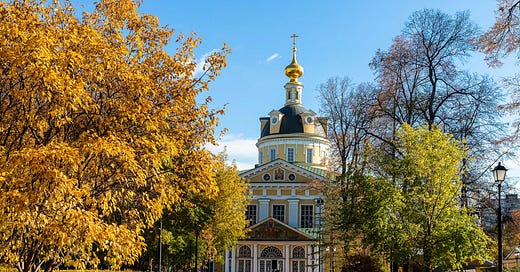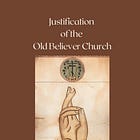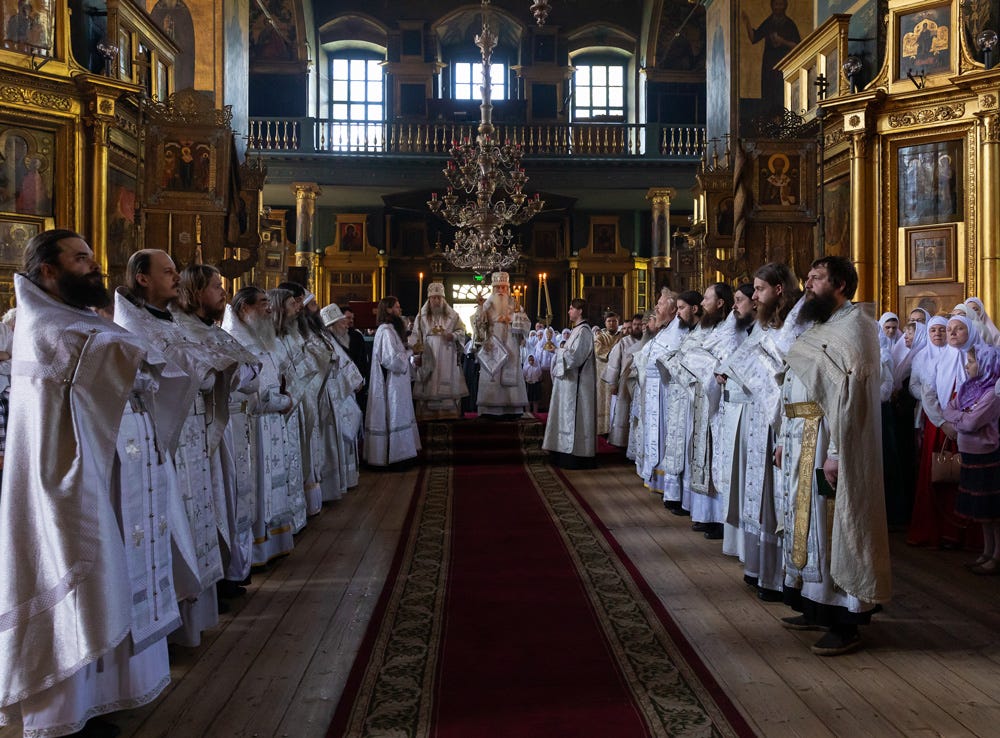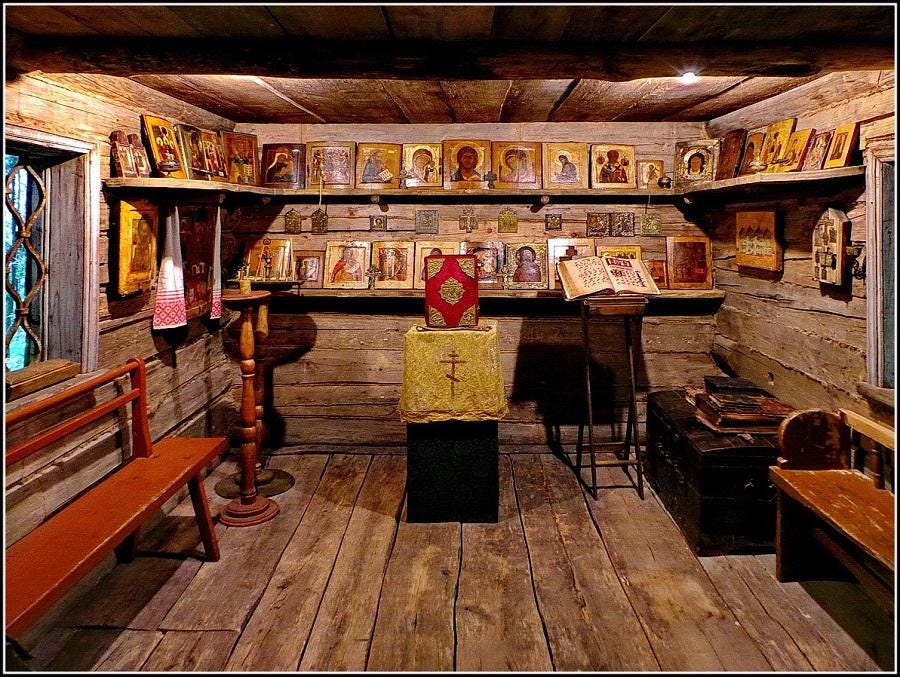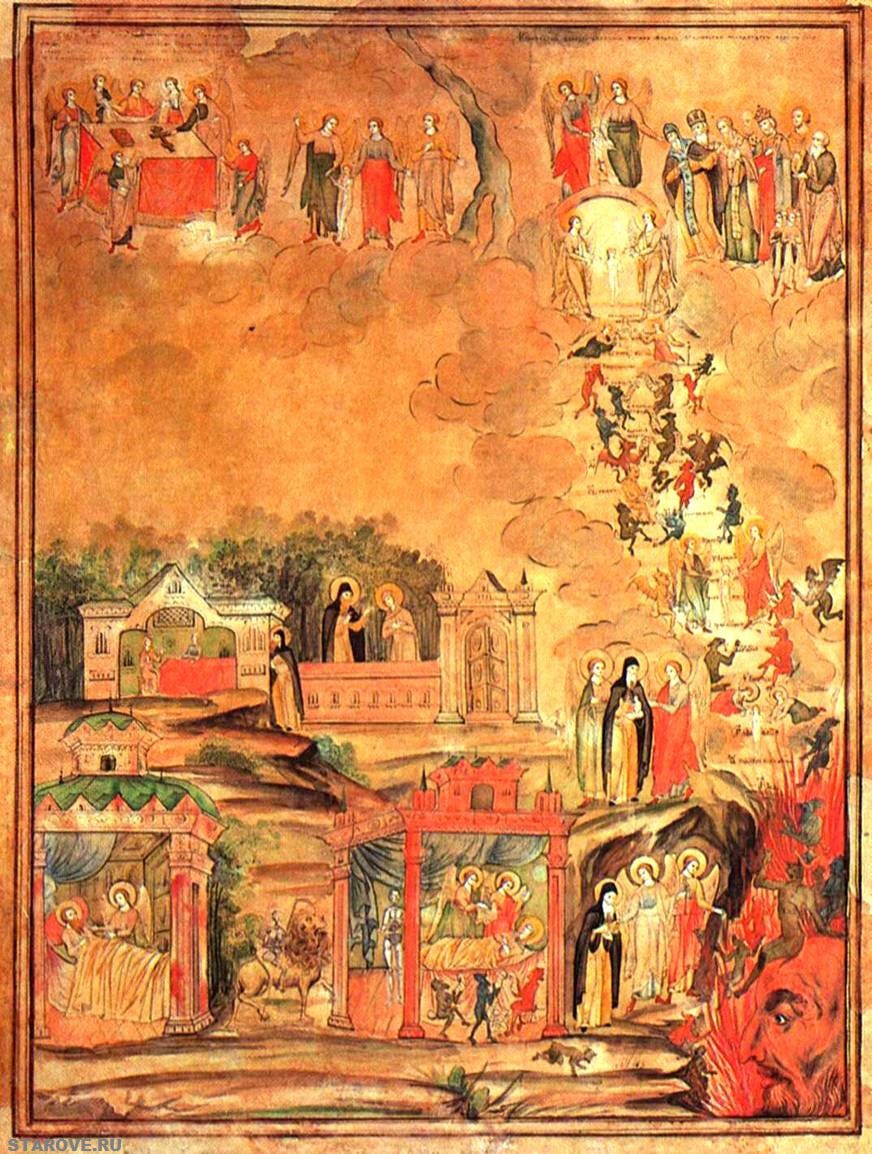100 Questions: Part 2
Why can there be only one true Church?
We believe in "One Holy Catholic and Apostolic Church," as stated in the Symbol of Faith. This dogmatic teaching should, in principle, suffice for any Christian. After all, we do not doubt other dogmas, just as a mathematician does not question the axioms of the geometric system in which they work.
However, human reason naturally seeks not blind faith in dogmas but understanding of them. Therefore, let us attempt, within the limits of our knowledge and ability, to answer this question.
The word "Church" (ecclesia in Greek) literally means "assembly." Some imagine the Church of Christ as a collective of people currently living on earth, believing in Christ, and united by a common hierarchy and sacraments. This definition was adopted by certain Synodal Church hierarchs in the 19th century. If this definition were considered exhaustive, it would indeed be unclear why the true Church must be only one. After all, there are many human communities that meet this definition, each claiming its own truth.
However, the Tradition of the Church teaches us differently. The Church is the assembly not only of those currently living on earth who truly believe in and love Christ (the earthly part of the Church, the "Church Militant," or "Fighting Church," struggling against the devil) but also of God’s Angels and the righteous who lived before, pleasing God through faith and acts of piety (the Heavenly Church, the "Church Triumphant"), with Christ Himself at its head. The Church in Christ also includes those righteous ones who are yet to be born and will live in future generations, for Christ, as God, exists outside of time, and for Him, the past, present, and future of our world coexist equally.
By its very nature, the Church is one and indivisible. It is united by the true faith of Christians and by the sanctifying and saving grace of the Holy Spirit. In the Heavenly Church, faith is always unified and immutable, as there is no place for the devil’s confusion and temptations that cause earthly changes in faith among some people. Those on earth who alter the faith thereby break the unity of faith not only with other people on earth but also with the Heavenly Church and with Christ Himself, the Head of the Church. About such individuals, Saint Jude the Apostle, the brother of the Lord, speaks with sorrow and indignation:
"These be they who separate themselves, sensual, having not the Spirit."
(Jude, verse 19)
Thus, all "church reformers" and heretics who introduce novelties into Church life and doctrine, rejecting the ancient Traditions of the Church, separate themselves from the Church and create their own earthly communities, cut off from the Heavenly Church. However, the saving grace of the Holy Spirit is given on earth only to those who remain in spiritual unity with the Heavenly Church.
Christ established one "One Holy and Apostolic Church," being its Head, and the Church is His Body. Just as a person cannot have two or more bodies with one head—this would be a monstrosity—so too does Christ have only one spiritual Body: His true Church.
For those who wish to delve deeper into this topic, I recommend reading the works of the Holy Fathers: Saint Cyprian of Carthage’s On the Unity of the Church, Saint Vincent of Lerins’ Commonitory, and Saint Arseny of the Urals’ Justification of the Old Believer Church.
— Archpriest Vadim Korovin
Why is the Russian Orthodox Old-Rite Church (RPSC) the true Church of Christ, and not the New Rite Church? After all, many call Old Believers schismatics.
The Holy Fathers call schismatics (heretics of the second rank) those who introduce novelties into Church tradition, thereby separating themselves from the unity of faith.
The Orthodox Old Believers not only introduced no novelties but actively resisted the innovations attempted by Patriarch Nikon and his like-minded followers.
The holy martyr Protopriest Avvakum wrote in his Fifth Petition to Tsar Alexei Mikhailovich:
"What is our heresy, or what schism have we brought into the Church, as the Nikonian liars write about us, calling us schismatics and heretics in their deceitful and God-hated 'Staff' (the book The Staff of Governance), and elsewhere even forerunners of the Antichrist? We know no heresies within ourselves—may the Son of God spare us from such impiety now and in the future—nor any schisms. God is our witness, as are the Most Pure Mother of God and all the saints! If we are schismatics and heretics, then so too are all our holy fathers, the pious rulers of old, and the holy patriarchs of the past. O heaven and earth, hear these flood-like words and their haughty tongues! Truly, O Tsar and Sovereign, we say to you: you dare boldly, but not to your benefit… If in our Orthodoxy, in the holy books of the fathers and their dogmas, there is found even a single heresy or blasphemy against Christ God and His Church, we are ready to be judged before all the Orthodox, even more so if we have introduced anything of our own—stumbling blocks or schisms—into the Church. But there is none, none! All the Church's teachings are righteous for those who understand the truth and find sound reason in Christ Jesus, not in the elements of this world, for which we suffer, die, and shed our blood."
The fact that the Orthodox Old-Rite Church of Christ contains no novelties or heresies is confirmed even by some New Rite theologians and preachers. For example, in the Exhortation of the Governing Synod to the Old Believers (1766), it is acknowledged that Old Believers in their two-finger sign of the cross "truly confess the Lord Jesus Christ" and do so "excellently." Similarly, in the preface to the Psalter (1866), Synodal publishers wrote that Old Believers associate "no erroneous reasoning" with the two-finger sign. The same Exhortation addresses Old Believers with the following words:
"Tell us, you who call yourselves Old Believers… why do you separate yourselves from us? You believe in the One God, glorified in the Holy Trinity, just as we do; you confess the Savior of the world, our Lord Jesus Christ, just as we do; you honor the Holy Gospel and the holy Ecumenical and Local Councils as rules of faith and pious living, just as we do; you expect the resurrection of the dead, just as we do; you hold that there will be rewards for the righteous and punishment for the wicked, just as we do. In these beliefs lies the entire essence of faith."
Church historians such as Professors N.F. Kapterev and E.E. Golubinsky convincingly demonstrated that the "old rites" are Orthodox traditions, not invented by the Old Believers, but adopted by the Russian Church from the ancient Orthodox Greek Church during the Baptism of Rus and preserved unchanged until the time of Patriarch Nikon. At the Local Council of the Moscow Patriarchate in 1971, Metropolitan Nikodim (Rotov) delivered a report stating:
"The Great Moscow Council of 1667 anathematized the Old Believers based on an incorrect view of the old Russian Church rites as heretical."
After hearing this report, the Council of the Moscow Patriarchate lifted the anathemas imposed on the old rites in the 17th century, declaring all curses pronounced against them "as if they had never existed."
Earlier, in 1929, the Synod of the Moscow Patriarchate wrote in its decree lifting the oaths against the Old Believers:
"We recognize the liturgical books printed under the first five Russian Patriarchs as Orthodox; the Church rites cherished by many Orthodox, Edinovertsy, and Old Believers as salvific in their inner significance and unity with the Holy Church. The two-finger sign of the cross, symbolizing the Holy Trinity and the two natures of our Lord Jesus Christ, was undoubtedly practiced in the Church of earlier times… Condemnatory expressions concerning the old rites, particularly the two-finger sign, wherever they may be found and whoever may have uttered them, we reject as if they had never existed."
Thus, the Orthodox Old-Rite Church introduced no innovations and remained faithful to ancient Church Tradition. The New Rite Church itself acknowledges that it was the one to introduce novelties in the 17th century, declaring the Church’s ancient Orthodox traditions heretical and anathematizing them, thereby blaspheming against the Orthodox Church as if it had harbored heresy until Nikon’s reforms. Based on this, we believe that it was the New Rite Church that created the Schism, breaking spiritual unity with the Church of Christ, while our Church has remained, and continues to remain, the true Church of Christ on earth.
— Archpriest Vadim Korovin
How should a Christian pray at home? What prayers and rules are appropriate? How long and how often should one pray?
There is an ancient saying: “The cell has no rule.” A layperson can develop a personal schedule for home prayer that suits their circumstances.
For guidance, one might look to the expectations for a monk’s private prayer. It is advisable to read Compline and Midnight Office daily, as these are part of the mandatory private prayer rule for monks.
Many Christians add to this prayers with a lestovka (a traditional Old Believer prayer rope), the reading of kathismas from the Psalter, and canons to the Lord, the Most Holy God-bearer, and various saints.
Some prefer to pray the Order of the Twelve Psalms twice daily, as this was the central part of private prayer for ancient desert ascetics, whether performed alone or with brethren.
For those living in Christian families, it is especially important to establish shared family prayers (for example, praying Compline and Midnight Office together with children and other family members).
Additionally, every Christian receives from their spiritual father a so-called epitimia—a personal prayer rule for daily use. This should be prayed daily, preferably alone, in private communion with God.
Some Christians, inspired by Psalm 118:164, “Seven times a day I praised Thee,” choose to pray seven times a day using the lestovka (performing 100 bows with the Jesus Prayer each time), as prescribed in the Teaching on the Lestovka, to commemorate the seven Church sacraments.
It is crucial to include in daily prayers intercessions for the health of clergy, one’s spiritual father, parents, children, relatives, and all Orthodox Christians.
Prayers for the departed should include petitions for the repose of “the most holy ecumenical patriarchs, pious kings and queens, blessed metropolitans, faithful great princes and princesses, God-loving archbishops and bishops, pious princes and princesses, venerable archimandrites and abbots, and all ranks of priests and monks, our forefathers, fathers, and brethren who lie here and everywhere, Orthodox Christians.” One should also remember deceased relatives who died in the faith of Christ. If any of them passed away unrepentant, prayers may be offered to St. Paisios the Great. For non-baptized or non-Orthodox departed, one may pray to St. Varus (Uar) the Martyr.
In prayer, the emphasis should be on quality rather than quantity—spiritual focus and attentiveness are key. If the mind becomes distracted (during private prayer), one should return to the start of the prayer and repeat it until the mind is centered. Otherwise, prayer may fail to please God and instead increase one’s sins.
Finally, prayer should begin with a heart at peace with all people, forgiving any wrongs committed against us. When we forgive others, the Lord will accept our prayer and forgive our own sins.
— Archpriest Vadim Korovin
What must a Christian observe to be deemed worthy of a Christian burial with a priest and commemoration for the departed during the liturgy?
The Order of Confession states:
"If a Christian dies without repentance, the priest must neither chant over him (burial service) nor offer the oblation (commemoration during the liturgy) for him, as he has not fulfilled the Law of God and the Christian faith."
In the same text, the priest admonishes his spiritual children:
"If, through the action of the devil, something happens (i.e., a sin is committed), confess it promptly to me, your spiritual father, so that the devil does not take root in your soul and death does not overtake you without repentance. For the Lord has said: 'Be ready, for you know not when the end will come.' We do not know the span of our life. If death finds us in sin, then what is the point of having been born at all?"
According to Church Tradition, the Lord has said:
"In the state in which I find you, in that will I judge you."
If a person dies in piety and repentance, this is beneficial and salvific for the Christian soul. However, if someone dies unrepentant in grave sins, they risk eternal torment rather than eternal salvation. Those who die without repentance (e.g., having not confessed for many years or lacking a spiritual father) are denied a Church burial. This is because, according to the rite, the burial must be performed by the deceased's spiritual father, who reads absolution prayers over the grave, forgiving all sins previously confessed. As stated in the book Chrysostom (Zlatoust), "If someone among us dies without repentance, it would have been better for them not to have been born. No oblation for them is worthy to be brought to God in the Church."
Additionally, the following categories of people are deprived of a Church burial and commemoration for the departed:
Those who do not hold the Orthodox faith (i.e., those who do not profess the Symbol of Faith).
Suicides (except for those mentally ill), including those who caused their death through:
Alcoholism or drug addiction.
Reckless boasting of bravery (e.g., climbing great heights or riding on the roofs of moving vehicles).
Swimming in rivers while intoxicated or during storms.
Those living in fornication or unblessed unions (unless they repented before death).
Sorcerers, fortune-tellers, spiritists, astrologers, and similar practitioners.
Unrepentant murderers and all others who died in mortal sin without repentance.
A Christian must prepare for death daily by living according to God’s commandments. If they fail, they must turn to the Sacrament of Confession. As the ancient saints said:
"Remember death, and you will never sin."
— Archpriest Vadim Korovin
Why should a married woman cover her head? Is it permissible to leave part of her hair uncovered? Should she also sleep with her head covered?
This question invites reflection. Indeed, it would seem unusual for those raised in a Christian environment from childhood. In pre-schism Rus’, such a question would have been unthinkable.
In ancient times, clothing served to cover the body. However, today’s morally corrupted world promotes the opposite: not so much to cover the body but to expose it, making it easier to entice potential “partners.” This trend originated in the West and was entirely absent in ancient Rus’.
Modern women entering the Church as adults often struggle with the Church’s prohibition against altering their appearance (using cosmetics, cutting their hair) and against displaying their uncovered hair. Questions like this arise frequently, just as they did 150 years ago. The Old Believer theologian and polemicist Ilarion Kabanov (Xenos) addressed such a question in his book The History and Customs of the Vetka Church:
"A maiden, as long as she remains a maiden, may sometimes be uncovered, for she also uncovers her head to partake of Holy Communion and communes with her hair unbound (this was a local custom in Vetka and southern Rus’). But when she marries, during the wedding ceremony, by the blessing of the priest, her head is covered with a headscarf and a headdress (called a glavotyagos, or bonnet), and she is crowned according to the Church rite. From that moment on, for the rest of her life until the day of her death, she has no right ever to uncover a single strand of hair but must always and forever remain covered. Thus commands the divine Apostle Peter, who says: ‘Let not the adornment of women be outward—braiding of hair, wearing of gold, or putting on fine apparel—but the hidden person of the heart’ (1 Peter 3:4). Similarly, the chief Apostle Paul legislates, saying: ‘If a woman does not cover her head, let her be shorn. But if it is a disgrace for a woman to be shorn or shaved, let her cover her head’ (1 Corinthians 11:6). And St. John Chrysostom, explaining these words, says that not only during prayer but always must a woman remain covered."
The foundation of this Church practice is found in the First Epistle to the Corinthians by St. Paul:
"Every woman who prays or prophesies with her head uncovered dishonors her head, for it is one and the same as if she were shaven… For a man indeed ought not to cover his head, since he is the image and glory of God; but the woman is the glory of man… For this reason, the woman ought to have a symbol of authority on her head, because of the angels… Judge among yourselves: Is it proper for a woman to pray to God with her head uncovered? Does not even nature itself teach you that if a man has long hair, it is a dishonor to him? But if a woman has long hair, it is a glory to her; for her hair is given to her for a covering."
(1 Corinthians 11:5–15)
Since the Apostle commands all Christians to pray “unceasingly” (1 Thessalonians 5:17), a woman should always keep her head covered, except during washing and combing her hair, which should be done in privacy, away from the gaze of others.
In ancient Rus’, exposing one’s hair was considered shameful for a woman. The word oprostovolosilas (literally, “made oneself bareheaded”) was synonymous with disgrace.
Wearing a head covering that leaves part of the hair exposed, on display, is unbecoming for Christian women.
— Archpriest Vadim Korovin
What is forbidden for an Old Believer and why? (e.g., smoking, drunkenness, profanity, shaving the beard, playing cards, working in sinful industries like tobacco or cosmetics, having abortions, dancing, wearing makeup, painting nails, women wearing pants or immodest clothing, cutting or styling hair, dyeing hair, etc.)
The Apostle Paul says:
"All things are lawful for me, but not all things are helpful."
(1 Corinthians 6:12)
Thus, we should view the restrictions mentioned not as a denial or violation of the freedom Christ has called us to, but as the Church’s guidance to help us on the path to salvation in Christ. Our life on earth is preparation for the "life of the age to come," as stated in the Symbol of Faith. Our task is to shape our soul during this earthly life in such a way that it is ready to enter that eternal life, where nothing alien to it will be admitted.
According to the Gospel, the two greatest commandments are love for God and love for one’s neighbor. If we love God, we will not resist the image in which He created us. The Lord praised all His creation, saying it was very good. A man created with a beard and mustache who dislikes this appearance and shaves it off is clearly rebelling against God’s will, essentially accusing God of not having created him well enough. This is a blatant act of failing to love God, violating His "first and greatest commandment."
The same applies to women who alter their appearance given to them by God—whether by dyeing their hair, applying makeup, or painting their nails.
Moreover, such men and women violate the second greatest commandment, love for one’s neighbor, because their altered appearance:
Sets a bad example for others.
Intentionally seeks to attract the opposite sex, often leading to impure thoughts or, in many cases, outright sin.
The same can be said of wearing inappropriate clothing as Christians—clothing that is overly tight or revealing—and of dancing. The Holy Fathers have said: "A dancing woman is the bride of Satan." Recall that the dance of Herodias' daughter led to the murder of the greatest prophet, St. John the Baptist.
Drunkenness is an obvious sin condemned in Scripture. Along with smoking and drug use, it poisons the body and soul, destroys health and morality, and defiles the human body, which the Apostle Paul calls the temple of God. "Woe to anyone who destroys this temple!" (1 Corinthians 3:17)
Artificial abortion, regardless of the method, is the heartless murder of a child, a mortal sin that damages both the soul and the body of the woman, often leaving her unable to bear children in the future. If a woman who has agreed to an abortion, killing her defenseless child, does not repent and cleanse herself through tears, prayer, fasting, acts of abstinence, confession, and a prolonged period of excommunication from Communion, she will not inherit the Kingdom of Heaven.
Games, when played by adults, waste the precious time given by God for learning love, making them harmful. Additionally, playing cards—favored tools of sorcerers and fortune-tellers—should not be touched by Christians. Gambling (games for money) aims to enrich oneself at the expense of others, violating the 10th Commandment, which forbids coveting.
A Christian must not "participate in the works of darkness," according to the Gospel. Therefore, it is improper to produce or sell tobacco or drugs, as this constitutes a grave sin against one’s neighbor.
In conclusion, all restrictions in Christianity do not infringe upon our freedom but protect us from using it in ways harmful to ourselves and others. They function like traffic rules—not intended to "oppress" drivers but to prevent their death, as well as the death of their passengers and pedestrians.
— Archpriest Vadim Korovin
What awaits a person after death?
From time immemorial, this question has deeply troubled humanity—a question about which A. S. Pushkin poetically remarked: "And the grave’s fateful secrets…"
“Dust thou art, and unto dust shalt thou return.” These words of God, spoken to Adam after his fall into sin, determined the mortality of all "born of Adam." Bodily death is a temporal boundary, a threshold we must approach prepared to transition into eternal life, lest we be deprived of it. The death we observe in this earthly world serves as a warning, a reminder of our responsibility for all we do, say, and think that is evil, and of the need to purify our souls from all defilement, for nothing impure can enter the Heavenly Kingdom.
For us, bound to earthly bodies, it is difficult to imagine another world—a spiritual world—because there is nothing in our earthly experience that corresponds to what lies “beyond.” We can only vaguely perceive, "as through a glass, darkly" (St. Paul the Apostle), glimpses of the spiritual world through the writings of the ancient saints to whom these mysteries were partially revealed.
Let us try, in brief words, to convey what has been made known to us through the saints. Bodily death is the separation of the soul from the body. The body decays in this material world, but the soul remains indestructible in the spiritual world. If a person lived outside the Church of Christ—either never baptized or baptized but living carelessly, without repentance, without the sacraments of the Church, and in unrepented mortal sins—then after death, demons seize the soul and carry it into the abyss of hell, where it languishes alongside other similar souls, anticipating eternal torment.
At this stage, they do not yet experience physical suffering, being separated from their bodies. However, after the resurrection of the dead and the reunion of souls with their bodies, unrepentant sinners will be cast into the "lake of fire" (Revelation) or "hellfire" (the Gospels), where there will be "weeping and gnashing of teeth," "where their worm dieth not, and the fire is not quenched" (Mark 9:48).
If, however, a person was baptized and lived a Christian life—confessing their sins and partaking of the Body and Blood of Christ—then after death, two Angels of God, sent by Him, come to take the soul: the Guardian Angel and another Angel who accompanies the souls of the departed (sometimes referred to as the Dread Angel). They lift the soul to Heaven, passing through the earthly atmosphere. Demons also appear, attempting to accuse the soul of various sins in the hope that the Angels will surrender it into their hands. The holy fathers were revealed that along the soul's journey to Heaven, there are about twenty “aerial tollhouses”—spiritual barriers where demons present the sins they have recorded, accusing the soul and claiming it belongs to their dominion and must descend into hell.
It is important to note here that every Christian, after baptism, is followed by an unseen demon who incites them to sin through mental suggestions and records every sin they commit. However, if a person confesses their sins in the sacrament of Repentance before a priest and fulfills their penance (a spiritual correction), these confessed sins are erased by the power of God and cannot be brought up at the tollhouses.
In opposition to the demons’ accusations, the Angels present the person's good deeds, as well as the prayers offered for the departed by those still living on earth: priests, relatives, and other Christians. It is as if on a set of spiritual scales, the sins, virtues, and prayers are weighed. If the sins outweigh, the Angels release the soul, and the demons greedily seize it, carrying it down into the abyss, while the Angels weep. If, however, the virtues and prayers outweigh, the demons are shamed into silence, and the Angels carry the soul higher, to the next tollhouse.
Each tollhouse has its own "specialization," so to speak, meaning that it examines sins of a particular kind. In the "Instruction of St. Cyril the Philosopher on the Departure of the Soul from the Body and the Tollhouses," we find the following list:
The first tollhouse is for slander: if we falsely accused anyone.
The second tollhouse is for calumny: if we defamed anyone, from our youth to our old age.
The third tollhouse is for envy.
The fourth tollhouse is for lying.
The fifth tollhouse is for rage and anger.
The sixth tollhouse is for pride.
The seventh tollhouse is for idle talk, obscene language, shameless words, and revelry at feasts.
The eighth tollhouse is for greed, robbery, extortion, and bribery.
The ninth tollhouse is for vanity, seeking praise, and human glory.
The tenth tollhouse is for love of gold and silver.
The eleventh tollhouse is for drunkenness and habitual drinking.
The twelfth tollhouse is for holding grudges, such as saying, 'I will never forgive you until my dying day.'
The thirteenth tollhouse is for sorcery, witchcraft, and magic.
The fourteenth tollhouse is for gluttony, including overeating, eating too early in the morning, eating at midday, and secret eating.
The fifteenth tollhouse is for heresies and superstitions: believing in omens, sneezes, first encounters, the cries of birds, divinations, retelling or listening to [pagan] fables, and playing the gusli.
The sixteenth tollhouse is for adultery: when husbands are unfaithful to their wives or wives to their husbands.
The seventeenth tollhouse is for robbery, murder, and all violence, including pulling someone’s hair until they bleed.
The eighteenth tollhouse is for theft and all forms of stealing.
The nineteenth tollhouse is for all types of fornication: with animals, with men, with prostitutes, or through self-abuse.
The twentieth tollhouse is for mercilessness and stinginess: here demons accuse the soul if at any time we have been harsh to a brother, or a beggar, or driven someone from our home, or threatened anyone. The demons accuse and prevail against us. For even if we keep all the commandments of God, yet are merciless to the poor and cruel to our servants or maids, failing to provide them with enough food or clothing, or if we oppress them with force or afflict them with any suffering, then for all these things, the soul will be tried and tormented by the aerial demons at the gates of Heaven.—From the book Zlatoust (Chrysostom), teaching for the 20th Sunday after Pentecost.
If the soul is virtuous and God-fearing, it passes through the tollhouses, and through the fear it experiences there, as well as through the grace of God sent on account of prayers offered for it by people on earth—especially through the bloodless sacrifices (commemorations during liturgies)—it is cleansed of its remaining minor sins. The Angels then lead the soul to the gates of the Heavenly Kingdom, where it is joyfully received by the heavenly Angels and the souls of the righteous. The soul is brought to bow before the Throne of God, and Christ mercifully meets it, commanding that it be shown the abodes prepared for the righteous, where they will dwell after the Last Judgment, and also the places of torment prepared for sinners. The soul witnesses all of this until the fortieth day after death. On the fortieth day, the soul is once again brought before the Throne of God, and Christ assigns it a resting place where it will remain until the Resurrection of the dead.
Therefore, let us strive to live according to God’s commandments, in active love for God and neighbor, in repentance, remaining close to God’s churches and the sacraments of the Church, partaking of the Body and Blood of Christ, which consume our sins and impurities, so that we may stand blameless before the Throne of the Most High. Let us also pray for departed Christians, commemorating them both at home and in church during liturgies and memorial services, so that both they and we may be deemed worthy of the Heavenly Kingdom with all the saints who have pleased God since the creation of the world.
—Archpriest Vadim Korovin.

